 |
|
"I dream with open eyes, and my eyes see." ~Heine
Heinrich Heine is one of the greatest poets in German literature, and indeed the world's.
I started reading his verse last summer and he is now my favorite poet of all time. Translated editions of his works
will always be limited and handicapped - every line of his poems contains beauty and feeling simply beyond the literal translation.
Heine was born in Dusseldorf in 1797, son to a Jewish merchant.
He studied law but couldn't get a job because of his background; in 1825 he converted to Christianity, calling it his "ticket
into European culture" (If Paris was worth a mass - he added, echoing the words of Henry IV - then Berlin is worth a sermon).
Then, finding a publisher, he started writing. His first major verse collection, "Buch der Lieder" (Book of Songs),
published in 1827, contains some of his greatest lyric poetry. For awhile he associated with the liberal literary
movement known as "Young Germany" and wrote prose pieces of social criticism with his unique blend of journalistic fact and
creative literary expression, as well as piercing satire that got him into trouble with authorities. In the early 1830s, the
conservative government issued a country-wide ban on the works of this movement, and on Heine's works as well. (Heine wrote
at the time: "Where they burn books, in the end they will also burn people.") He fled to Paris to avoid arrest and stayed
in this voluntary exile for the rest of his life, meanwhile continuing to write. There was no great social acceptance here
either: if to the Germans he remained an outsider, to the French he remained a German. Two of his important prose works of
this period are "The History of Religion and Philosophy in Germany" (infinitely more entertaining than its title implies),
and "The Romantic School"- a critical study of this movement spiced with his characteristic irony. Heine also wrote poems
expressing his political and social views, including the mock-epic "Germany: a Winter's Tale", which he wrote after
secretly visiting his family in 1842 and which violently attacks the faults of the contemporary regime. Anticipating the critics'
accusations that he was an "un-German" political enemy, Heine wrote in his introduction: "I already hear your beery voices
- 'You have violated our colors, you scorner of the fatherland, you friend of the French, to whom you would surrender the
free Rhine!' Calm yourselves! I will honor and respect your colors when they deserve it, when they no longer represent a
slavish play-acting. Plant the black-red-gold flag on the heights of German thought, make it the standard of a free humanity,
and I will give my best heart's blood for it. I love the Fatherland as much as you do. Because of this love, I spent thirteen
years in exile and because of this love I return to exile perhaps forever." Indeed he loved his land - loved it in a pure,
ideal form, but not what has become of it. In 1848, he
had an onset of illness (paralysis of the spine) which partially blinded him and confined him to bed for the rest of his life.
This didn't stop him from writing, and in the years that followed he produced two more poetry collections. "Romancero", the
greatest of these two, contains his darkest visions of the brutality of society and life in general. He died
in 1856.
Attempts to raise a monument for him provoked riots and
remained unsuccessful in the last century. During the Third Reich years, his works were banned again- only his
"Lorelei" poem, so beloved that it acheived the status of a folk song, was kept in print marked "author unknown". When Germany
occupied France during World War II, Heine's grave was desecrated and the tombstone destroyed. It is now rebuilt, and his
monument stands in both Paris and Berlin.
I have divided the poems below in four sections.
The upper right one contains his lyrics from the "Book of Songs", the upper left one has a selection from his "North Sea"
poetic cycle. The bottom right one includes the darker, reflective poems from "Romancero". The bottom left, under another
poem from "Romancero", contains his spine-chillingly prophetic description about the state of German philosophy, for the most
part in my translation with some help.
The poems "Storm", "Downward from the eyes of heaven...",and
"The Shipwrecked One" are from the "North Sea" poetic cycle, written in free verse. The translations of "The Shipwrecked One",
"Dear sweetheart...", and the first stanza of the "Storm" poem are my own. The "Lorelei" and "they bore a love..." poems are
translated by Walter Arndt; the rest is Hal Draper's with some of my changes.
Alongside some translations I add the poems
the way they appear in German. The paintings posted in the "North Sea" quarter are by J.M.W. Turner; the "Romancero" poems
in bottom half are illustrated with some works by Chagall; the letter below is in Heine's handwriting, from 1840's.
|
|
Storm
Rages the storm
And whips the waves
And the waves - foaming, furious,-
Rise stubbornly higher, and as if alive,
White mountains of water are heaving.
With struggle the little
ship climbs them,
To be suddenly tossed
To the deep, far-yawning watery gulf -
O Sea!
Mother of Beauty, the foam-born goddess!
Grandmother of love! spare me!
Already the white ghostly sea
gull
Comes hovering, scenting a corpse,
And sharpens his beak on the topmast,
And slaves with hunger
to feed on a heart
Which rings with the glory of your daughter
And which your grandson, the little rogue,
Has picked as his plaything.
In vain are my pleas and entreaties!
My cries are drowned in
the raging storm,
In the battle din of the winds.
It roars and whistles and rattles and howls,
A madhouse
of sounds!
Through it all I distinctly hear
The luring tones of harpstrings,
A singing wild with yearning,
Melting the soul and rending the soul,
And I recognize the voice.
Afar on Scotland's rocky
coast
Where a gray castle just out
Over the wild-foaming sea,
There, at a high-vaulted casement,
Stands a beautiful, stricken woman,
Spirit-delicate and marble-pale,
And she plays the harp and sings,
And the wind ruffles through her long hair
And carries her dark, dark song
Over the wide and stormy
sea.
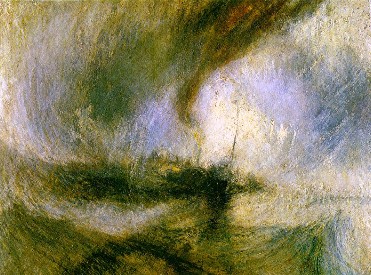
* * *
Downward from the eyes of heaven
Golden sparks
are falling, trembling
Through the night; my soul strains upward,
Far as love can reach and farther.
O, you
lovely eyes of heaven,
Weep your fill into my spirit!
That the glistering starry teardrops
Fill my soul to overbrimming.
[the poem in original:]
Aus den Himmelsaugen droben
Fallen zitternd goldne Funken
Durch die Nacht,
und meine Seele
Dehnt sich liebeweit und weiter.
O, ihr Himmelsaugen droben!
Weint euch aus in meine Seele,
Dass von lichten Sternentränen
Überfliesset meine Seele.
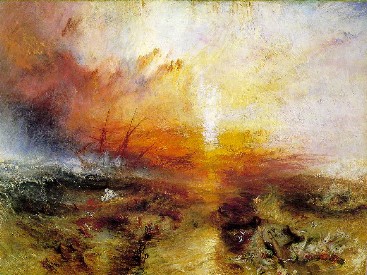
The Shipwrecked one
Hope and love! All is shattered,
And I myself, like a corpse
Thrown out wrathfully by the sea,
Lie on the shore,
On the empty, cold shore.
Before me heaves the watery desert,
Behind me lie but grief and misery,
And above me, the clouds are floating, --
The faceless gray daughters of air;
They draw the water from the sea
In pails of fog,
And toilsomely drag it and drag it,
Anf again spill it out into the sea, --
A dull, tedious task,
And meaningless, like my life.
The waves are murmuring, the seagulls screeching,
Old admonitions drift at me;
Forgotten dreams, extinguished images,
Tormentingly sweet, plunge forth again.
A woman lives in the North,
A beautiful woman, regally beautiful.
The white glossy garment surrounds
Her slender cypress figure,
The dark waves of hair,
Like a sacred night,
Streaming down from the wreath-crowned head,
Gently enclose
Her lovely, pale face;
And on her lovely, pale face
Shine the eyes, vast and powerful,
Like a black sun.
O, you black sun, how often,
How blissfully often, have I drunk from you
The wild flames of inspiration,
And stood, and reeled, intoxicated with fire --
Then a dove-mild smile passed
On the haughty, proud lips,
And the haughty, proud lips
Whispered words, sweet as moonlight
And tender as fragrance of rose --
And my soul lifted up
And flew, like an eagle, into the heaven!
Be silent, you waves and seagulls!
All is past, happiness and hope,
Hope and love! I lie on the ground,
A desolated, shipwrecked man,
And press my burning face
To the wet sand.
|
|
 |
 |
 |
 |
|
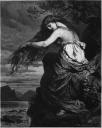
Lorelei
I wonder what it presages --
I am so sad at heart;
A legend
of bygone ages
Haunts me and will not depart.
The air is cool, and it darkles,
And calmly courses the Rhine.
The peak on the mountain sparkles
As evening rays on it shine.
The fairest maid is seated
All wrapt in
enchantment there;
Gems gleam on her, gold-ensheeted,
She combs her golden hair.
She combs with a comb that
is golden
And sings a song withal,
Its strain is of spell-enfolding,
All-overpowering thrall.
The sailor
in his poor schooner
Is seized with a savage woe;
Would gaze at the summit sooner
Than down at the reefs below.
I think the waves must devour
Both sailor and ship ere long;
Which came to pass by the power
Of Lorelei
and her song.
[The poem in original:]
Lorelei
Ich weiss nicht, was soll es bedeuten,
Daß ich so traurig bin;
Ein Märchen aus alten Zeiten,
Das kommt mir nicht aus dem Sinn.
Die Luft is kühl und es dunkelt,
Und ruhig fliesst der Rhein;
Der Gipfel des Berges funkelt
Im Abendsonnenschein.
Die Schönste Jungfrau sitzet
Dort oben wunderbar,
Ihr goldnes Geschmeide blitzet,
Sie kämmt ihr goldenes Haar.
Sie kämmt es mit goldenem kamme
Und singt ein Lied dabei;
Das hat eine wundersame,
Gewaltige Melodei.
Den Schiffer im kleinen Schiffe
Ergreift es mit wildem Weh;
Er schaut nicht die Felsenriffe,
Er schaut nur hinauf in die Höh.
Ich glaube, die Wellen verschlingen
Am ende Schiffer und Kahn;
Und das hat mit ihrem Singen
Die Lore-ley getan.
* * *
Maiden with the mouth so rosy,
With the eyes so sweet and bright,
O my darling little maide,
I of thee think day and night.
Long is now the winter evening.
Fain would I disperse its gloom,
Sitting by thee, talking with thee
In thy trusty little room.
To my lips I'd fain be pressing
Thy dear little snowy hand,
With my falling tears caressing
Thy dear little snowy hand.
[poem in original:]
Mädchen mit dem roten Mündchen,
Mit den Äuglein hell und klar,
Du mein liebes, kleines Mädchen,
Deiner denk' ich immerdar.
Lang ist heut' der Winterabend,
Und ich möchte bei dir sein,
Bei dir sitzen, mit dir schwatzen
Im vertrauten Kämmerlein.
An die Lippen wollt' ich pressen
Deine kleine weiße hand,
Und mit Tränen sie benetzen,
Deine kleine weiße Hand.
* * *
Dear sweetheart, lay your hand upon my heart; --
Oh, do you hear the beating in its little chamber?
A carpenter dwells there, evil and vicious,
he is nailing me a coffin.
He hammers and pounds by day and by
night,
for a long time already this has deprived me of sleep.
Oh, hurry yourself, Master Carpenter,
that I may
sleep soon!
*[poem in origilal]*
Lieb' Liebchen, leg's Händchen aufs Herze mein,--
Ach, hörst du wie's
pochet im Kämmerlein?
Da hauset ein Zimmerman, schlimm und arg,
Der zimmert mir eine Totensarg.
Es hämmert
und klopfet bei Tag und bei Nacht.
Es hat mich schon längst aus den Schlaf gebracht.
Ach, sputet euch, Meister Zimmermann,
Damit ich balde schlafen kann!
|
|
 |
 |
 |
|
|
 |
|
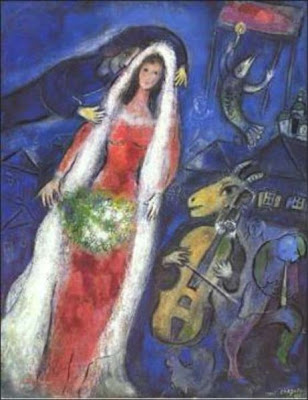
The "Princess Sabbath" poem, which Heine wrote in late 1840's, is taken from the 'Hebrew Melodies' section of his "Romancero"
collection. Although he was not religious, and for all the humor and irony at play here, he cannot escape his affection for
the subject. As he wrote elsewhere: "Every man, either to his comfort or terror, has some sense of religion."
(The reference to Schiller in stanza 26 is a parody on his Ode to Joy, which begins with "Freude, schönes Götterfunken, Tochter
aus Elysium..")
Princess Sabbath
In Arabia's books of stories
Read we of bewitched princes,
Who from time to time recover'd
Their once handsome pristine features;
Or the loathsome hairy monster
to a king's son is converted,
Dress'd in gay and glittering garments,
And the flute divinely playing.
Yet the magic time expires,
And once more and of a sudden
We behold his royal highness
Changed into a shaggy monster.
Of a prince of such-like fortune
Sings my song. His name is Israel,
And a witch's art has changed him
To the figure of a dog.
As a dog, with doggish notions,
All the week his time he muddles
Through life's filthiness and sweepings,
To the scavengers' derision.
But upon each Friday evening,
Just at twilight, the enchantment
Ceases suddenly, the dog
Once more is a human being.
As a man, with human feelings,
With his head and chest raised proudly,
Dress'd in festival attire,
his paternal halls he enters.
"Hail, all hail, ye halls beloved
Of my gracious regal father!
Tents of Jakob, your all-holy
Entrance posts my mouth thus kisses!"
Through the house mysteriously
Goes a whispering and a buzzing,
And the unseen master of it
Shudd'ring breathes amid the silence,
Silence, save the seneschal,
(Vulgo synagogue-attendant)
Here and there with vigor springing,
As the lamps he seeks to kindle.
Golden lights so comfort-giving,
How they glitter, how they glimmer!
Proudly also flare the tapers
On the rails of the Almemor.
At the shrine wherein the Torah
Is preserv'd, and which is cover'd
With the costly silken covering
That with precious jewels sparkles,
There beside his post, already
Stands prepared the parish minstrel,
Dandy little man, who shoulders
His white cloak coquettishly.
His white hand to show the better,
At his neck he works, his finger
Pressing strangely to his temple,
And his thumb against his throat.
To himself then softly trills he,
Till at length his voice he raises
Joyfully, and loudly sings he:
"Lecho Daudi Likras Kalle!
"Lecho Daudi Likras Kalle
Loved one, come! The bride already
Waiteth for thee, to uncover
To thy face her blushing features!"
This most charming marriage ditty
Was composed by the illustrious
Far and wide known Minnesinger
Don Jehuda ben Halevy.
In the song was celebrated
The espousals of Prince Israel
With the lovely Princess Sabbath,
Whom they call the silent princess.
Pearl and flower of perfect beauty
Is the Princess. Fairer never
Was the famous queen of Sheba,
Solomon's old bosom-friend,
Ethiopian vain blue-stocking,
Who with her esprit would dazzle,
And with all her clever riddles
Was, I fear, extremely tedious.
But our Princess Sabbath, who was
Peace itself personified,
Held in utter detestation
All debates and wit-encounters.
Equally abhorr'd she noisy
And declamatory passion,
All that pathos which with flowing
And dishevell'd hair storms wildly.
Modestly the silent princess
in her hood conceals her tresses;
Soft as the gazelle's her looks are,
Slender as a Haddas blooms she.
She allows her lover all things
Save this one, tobacco-smoking:
"Loved one! Smoking is forbidden,
For today the Sabbath is.
"But at noon, in compensation,
Thou a steaming dish shall taste of,
Which is perfectly delicious
Thou shall eat today some Cholent!"
"Cholent, beauteous spark immortal,
Daughter of Elysium!"
Thus would Schiller's song have sung it,
Had he ever tasted Cholent.
Cholent is the food of heaven,
Which the Lord Himself taught Moses
How to cook, when on that visit
To the summit of Mount Sinai.
Where the Lord Almighty also
Every good religious doctrine
And the holy ten commandments
Publish'd in a storm of lightning.
Cholent is the pure ambrosia
That the food of heaven composes
It's the bread of Paradise;
And compared with food so glorious,
That ambrosia of the spurious
Heathen gods whom Greece once worshiped
And were naught but muffled devils,
Was but wretched devil filth.
When the Prince this food hath tasted,
Gleams his eye as if transfigured,
And his waistcoat he unbuttons,
And he speaks with smiles of rapture:
"Hear I not the Jordan murmuring?
Is it not the gushing fountains
In the palmy vale of Beth-El,
Where the camels have their station?
"Hear I not the sheep-bells ringing?
Is it not the well-fed cattle
Whom the herdsman drives at evening
Down from Gilead's lofty mountain?"
Yet the beauteous day fads quickly;
As with long and shadowy legs
Hastens on the fell enchantment's
Evil hour, the Prince sighs sadly,
Feeling as though with his bosom
Icy witch's fingers grappled,
He's pervaded by the fear of
Canine metamorphosis.
To the Prince then hands the Princess
Her own golden box of spices.
Long he smells, once more desiring
To find comfort in sweet fragrance.
Next the parting drink the Princess
Gives the Prince; he hastily
Drinks, and in the goblet only
Some few drops are left untasted.
With them sprinkles he the table,
Then he dips the little waxlight
In the moisture, till the candle
Sadly crackles and goes out.
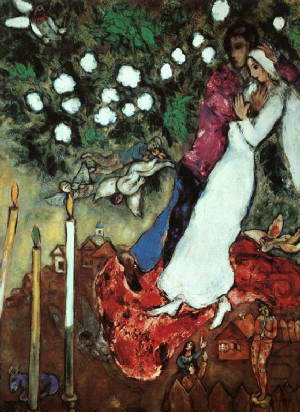
"...Nature philosophers would be more terifying than anyone else,
since they would actively take part in a German revolution and would identify themselves with the work of destruction.
The nature philosopher will be terrible because he allies himself with the primeval powers of nature, can conjure up the demonic
forces of ancient German pantheism, and there awakens in him that lust for battle which we find among the ancient Germans
and which fights not in order to destroy, but simply in order to fight. Christianity - and this is its finest merit - subdued
that brutal Germanic lust for battle, but could not destroy it, and if some day that restraining talisman, the Cross, falls
to pieces, then the savagery of the old warriors will explode again, the mad beserker rage about which the Nordic poets have
told so much. This talisman is decaying, and the day will come when it will completely disintegrate. The old stone gods will
then arise from the forgotten ruins and wipe the dust of centuries from their eyes, and Thor will at last leap up with his
giant hammer and smash the Gothic cathedrals. Don't smile at my advice, the advice of a dreamer who warns you against Kantians,
Fichteans, and nature philosophers. Don't smile at the visionary who expects in the realm of reality the same revolution that
has taken place in the realm of the intellect. The thought precedes the deed as lightning precedes thunder. German thunder
is of course truly German; it is not very nimble but rumbles along rather slowly. It will come, though, and if some day you
hear a crash such as has never been heard before in world history, you will know the German thunder has finally reached its
mark. A play will be performed in Germany compared to which the French Revolution might seem merely an innocent idyll..."
~Heinrich Heine, from "The History of Religion and Philosophy in
Germany", 1833.
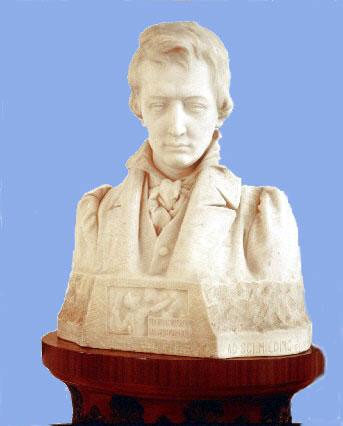
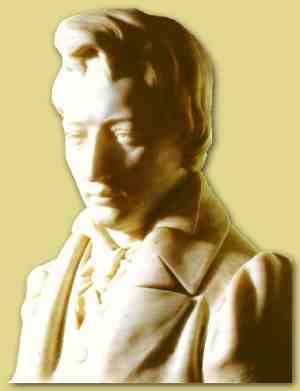
|
|
 |
|

The poems below are autobiographical. The "Abroad"poems were written by Heine in the 1840's during his Paris exile. The
"Lazarus" poems are from his "Romancero" collection, written in the early 1850's after the onset of his fatal illness.
Abroad (1)
Thou art today of sadder seeming
Than thou hast been for long before;
Mute tears upon thy cheeks
are gleaming,
Thy sighs wax louder more and more.
Of thy fair home long vanish'd is it
That thou art thinking,
full of pain?
Wouldst thou not joyfully revisit
Thy much-loved fatherland again?
Art thinking now of her who
sweetly
With any rage enchanted thee?
Vex'd by her oft, ye soon completely
Were reconciled, and laughed with glee.
Art
thinking of the friends whom yearning
Impell'd to fall upon thy breast?
Within the heart the thoughts were burning,
And
yet the lips remain'd at rest.
Or of the sister and the mother
Art thinking, who approved thy suit?
Methinks
within thy breast, good brother,
Wild passions fast are growing mute.
Of the fair garden art thou thinking,
Its
birds and trees, where love's young dream
Ofttimes sustain'd thy spirits sinking,
And hope shone forth with trembling
beam?
Tis late. The snow has fallen thickly,
Bright night illumes the humid mass;
I now must go, and hasten quickly
To
dress for company, Alas!
(2)
Of my fair fatherland I once was proud;
Beside the stream
The oak soared high, the violets gently bowed.
It
was a dream.
German the kisses were, in German too
(Sweet then did seem
The sound) it spoke the words: "Yes,
I love you!"
It was a dream.
[poem in original:]
Ich hatte einst ein schönes Vaterland.
Der Eichenbaum
Wuchs
dort so hoch, die Veilchen nickten sanft.
Es war ein Traum.
Das küßte mich auf deutsch und sprach auf deutsch
(Man
glaubt es kaum
Wie gut es klang) das Wort: "Ich liebe dich!"
Es war ein Traum.
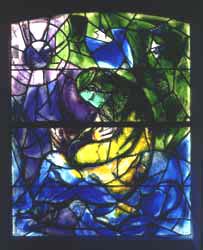
Lazarus (2)
It was the dark woman who pressed my head
Against her heart one day.
Oh, where her poisoned
tears were shed
My hair has turned to gray.
She kissed me ill, she kissed me lame
And blind in these eyes of
mine;
She wildly drank, in passion's name,
The strength from out my spine.
My body's now a corpse, a cage
That
holds my soul in chains
It shakes the bars in berserk rage,
It roars and storms and strains.
Impotent curses!
All too weak
To slay a fly in air.
Endure your fate it's time to seek
Comfort in thoughts, in prayer.
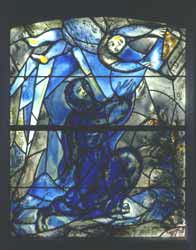
(4)
I once saw many flowers blooming
Upon my way, in indolence
I scorned to pick them in my going
And
passed in proud indifference.
Now, when my grave is dug, they taunt me;
Now, when I'm sick to death in pain,
In
mocking torment still they haunt me,
Those fragrant blooms of my disdain.
But most of all, my heart is burning
With
a bright yellow violet fair;
Wild beauty! How I grieve with yearning
To think that I enjoyed you ne'er!
My
comfort is: Oblivion's waters
Have not yet lost their olden might
The dull hearts of earth's sons and daughters
To
steep in Lethe's blissful night.
|
|
|
|